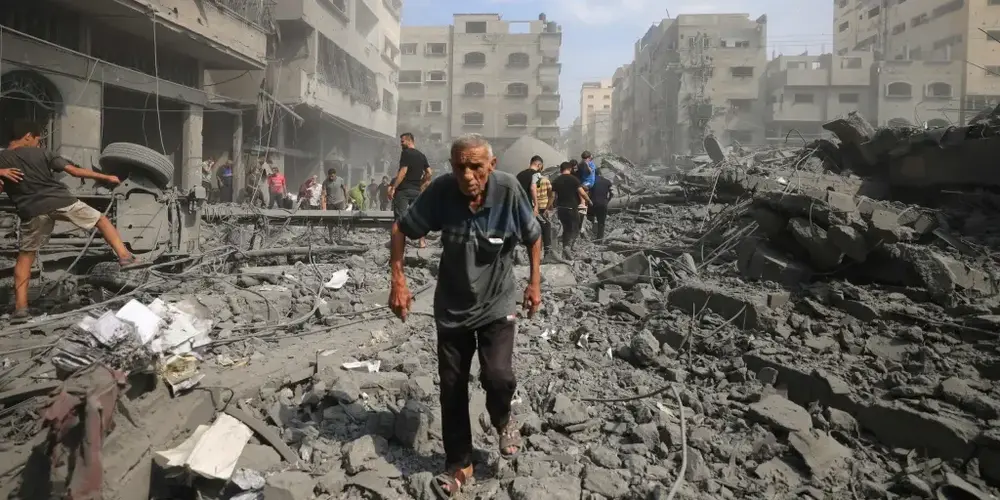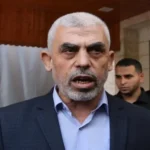Palestinians in Gaza and foreign nationals are facing a dire situation as they try to evade the impending risk of an Israeli ground invasion. With critical electricity, food, fuel, and water shortages, escape routes are vanishing. International pressure is growing on Egypt to open its border, but numerous challenges stand in the way. Israel’s military aims to dethrone Hamas in Gaza, adding to the urgency. Despite the urgency, complications arise, including Hamas’s reluctance to allow an evacuation.
Thousands are already seeking refuge in UN-run schools, while others, like Rama Nasrawi, struggle to find a safe path. Food shortages and overwhelmed hospitals worsen the situation. Diplomatic discussions are ongoing, with the U.S. and Egypt primarily focusing on securing safe passage for their citizens. But as pressure mounts, the plight of Palestinians remains uncertain.
As Palestinians and foreign nationals in Gaza face an increasingly dire situation, the possibility of escaping the anticipated Israeli ground invasion is becoming more elusive. The Gaza Strip is grappling with severe shortages of essential resources, including electricity, food, fuel, and water, leaving those trapped in the region in a precarious predicament.

A Palestinian woman walks after she collects her belongings inside her damaged house following an Israeli air in the northern Gaza Strip.
International pressure is mounting on Egypt to open its border crossing with Gaza, potentially allowing its two million residents to seek refuge beyond the conflict zone. However, Egypt’s government has been resistant to easing border restrictions for several years. They express concerns that terrorists might exploit such an opportunity to blend with civilians, potentially creating security issues for Egypt. Furthermore, the Egyptian government argues that an exodus of Gazan residents could endanger the territorial integrity of Palestinian territory.
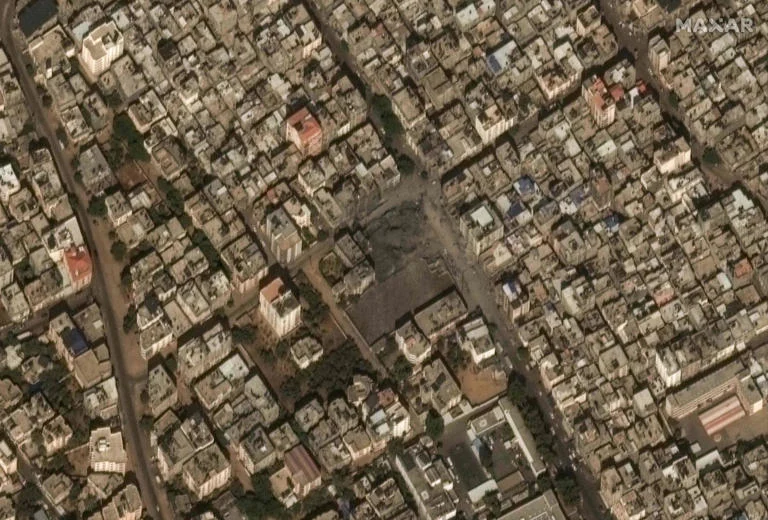
The Israeli military announced its intention to topple Hamas as the ruling authority in Gaza. This declaration responded to a cross-border raid in which Hamas was accused of killing over 1,300 Israelis, including many civilians. To further intensify the situation, Israeli officials have called on entire neighborhoods in Gaza to evacuate their homes. Additionally, supplies of food, fuel, and water to the enclave have been severely restricted, exacerbating the humanitarian crisis.
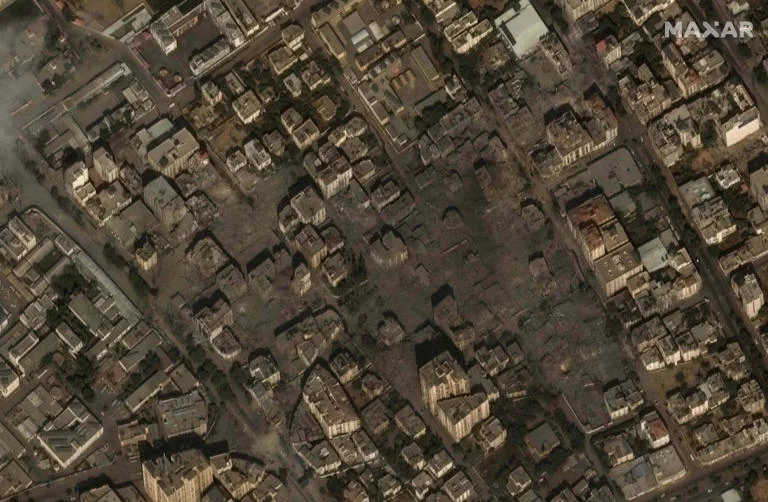
In light of these dire circumstances, the White House is actively collaborating with Egypt and Israel to explore safe passage options for the civilians in Gaza who are desperate to leave. The White House National Security Council Spokesman, John Kirby, stated, “This isn’t their fault. They didn’t cause this. And if they want to leave, they should be allowed to leave.” These efforts aim to provide a lifeline for those caught in the crossfire.
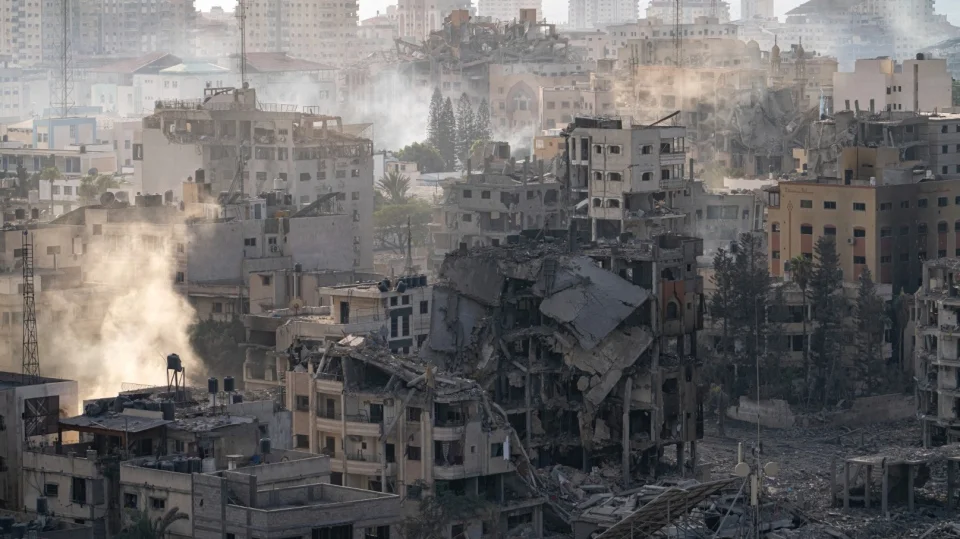
Palestinians inspect the destruction from Israeli airstrikes in Gaza City's al-Rimal neighbourhood early on October 10, 2023
Just before midnight local time, Israel’s military relayed a message to the United Nations, stating that its staff and approximately 1.1 million civilians should evacuate the northern part of the Gaza Strip within the next 24 hours. However, this directive has been met with concern and objection. The United Nations called for Israel to rescind the evacuation order, as it could transform an already tragic situation into a catastrophic one.
The @UN must be allowed access to deliver urgent humanitarian assistance to Palestinian civilians trapped & helpless in the Gaza Strip.
— António Guterres (@antonioguterres) October 9, 2023
I appeal to the international community to mobilize immediate humanitarian support for this effort. pic.twitter.com/Y3VmubuhtV
U.S. Secretary of State Antony Blinken has also been actively addressing this crisis. During a visit to Israel, he discussed the possibility of safe passage with Israeli officials and expressed his intention to pursue the topic with other countries in the coming days. Blinken’s efforts underline the urgent need to address the situation in Gaza.
Despite these international efforts, the situation remains fraught with complications. Hamas officials have publicly expressed reluctance to permit a mass evacuation of Gaza. They argue that such an evacuation could lead to permanent exile for Palestinians who leave, a prospect they are unwilling to accept. This reluctance further complicates the already challenging situation in Gaza.
Israel’s extensive bombing campaign has triggered a frantic search for regional safety. Over 338,000 individuals have fled their homes in search of shelter. Two-thirds of these displaced people have sought refuge in United Nations-run schools, while others are staying with relatives or seeking accommodations in hotels.
One poignant example of the struggles faced by those caught in the conflict is the story of Rama Nasrawi, a 43-year-old Canadian mother of two. She had arrived in Gaza in early October for what was supposed to be a joyous family reunion after 25 years of separation. Initially, they believed they were in a relatively safe neighborhood in the center of the Gaza Strip. However, their plans were shattered when they were bombarded on a fateful Saturday.
In response to the intensifying conflict and Israel’s declaration of war, Nasrawi left Gaza with her two children through the Rafah border crossing into Egypt. She was one of the fortunate few in Gaza with a foreign passport and had received special permission to cross via this route, typically open only to individuals with special permits from Egyptian authorities. However, as officials were processing their departure and stamping their passports, Israeli warplanes bombed the border area.
Chaos ensued, with travelers screaming and scrambling to exit the facility. Nasrawi vividly described the chaotic scene, where she leaped over the counter to secure their passports. Regrettably, many others lost their passports amid the confusion. She returned to her relatives’ home, where the pressing question of how to evacuate remained unanswered. The Israeli military’s rationale for attacking the border crossing remains unexplained, adding to the uncertainty of the situation.
The challenges extend beyond the immediate need for evacuation. The World Food Program has warned that shops in Gaza will run out of food supplies in less than a week. Hospitals in the region face the risk of becoming mass morgues as they lose power, according to the International Committee of the Red Cross. Ghassan Abu Sittah, a British-Palestinian surgeon working in Gaza’s al-Shifa Hospital, revealed his dire circumstances. The hospital currently accommodates around 5,000 wounded individuals but has only 2,500 available beds. Moreover, there is no more space in the operating rooms, underscoring the situation’s urgency.
The discussions between the United States and Egypt have primarily centered on securing safe passage for the 500 to 600 Americans in Gaza. Similar conversations have taken place between the government of President Abdel Fattah Al Sisi and various countries seeking to evacuate their own nationals from the conflict-ridden region. However, the focus has been predominantly on evacuating American citizens. One Arab official commented, “The idea of opening Rafah for all civilians was not discussed. The Americans were speaking with us only about the safe passage of Americans.”
Despite these diplomatic efforts, logistical challenges and obstacles persist. These challenges include a substantial crater on the Gaza side of the Rafah border crossing, resulting from recent Israeli projectile attacks. This damage has rendered access to the crossing virtually impossible. While Egypt managed to send some humanitarian aid via Rafah in the initial days of the conflict, Israel later informed the Egyptian government that it would no longer allow passage through the crossing, exacerbating the crisis.
Furthermore, Israeli authorities have been hesitant to approve the opening of the Rafah border crossing. This reluctance is evident as Israel continues conducting retaliatory strikes following the attacks on Saturday. Consequently, Egypt’s capacity to address the situation is significantly constrained. One Arab official emphasized that these governments must also engage with Israel to resolve the crisis effectively.
Egyptian officials have expressed concerns about an imminent influx of Palestinians attempting to cross the border, intensifying the pressure on the government to reconsider its position. Ezzedine Choukri Fishere, a former Egyptian diplomat now serving as a senior lecturer at Dartmouth College, articulated the situation. He explained that the regime might face public pressure to open the crossing when the number of those displaced by the conflict reaches a critical point. This could be particularly significant with the imminent collapse of health services and utilities in Gaza, further compounding the crisis.
Egypt’s Foreign Ministry has called on Israel to refrain from bombing the Palestinian side of the Rafah border crossing to ensure its proper functioning. Egypt is also actively engaged in efforts to send aid through the crossing and has called on relief organizations to fly essential supplies into the city of al-Arish in Egypt’s North Sinai region.
The prevailing sense among Gaza’s residents is one of profound insecurity. Areas once considered relatively safe have come under Israeli bombardment in recent days. According to the United Nations, Israeli airstrikes have targeted 18 U.N.-run schools since the offensive began. This includes two schools that were being used to shelter displaced people. Furthermore, the strikes have impacted 70 schools run by the Palestinian Authority, as the United Nations Office for the Coordination of Humanitarian Affairs reported.
The Israeli military has admitted to a reduced capacity for precision strikes due to the stretched-thin nature of its forces. These circumstances have left individuals like Awad Qistha, a 66-year-old Palestinian-American English lecturer at Al-Azhar University, desperate. Qistha fled his home in Rafah in southern Gaza at 5:30 a.m. on a Tuesday morning, only to realize that he and his family had nowhere to go. As a result, they returned to the garden of their house, where they could do little more than wait out the ongoing bombing.
Amid the escalating crisis, Qistha’s sentiment encapsulates the feelings of countless others in Gaza: “Nowhere is safe.” Should the border open, he contemplates leaving the strip, but his plan is to surrender to the will of a higher power. The uncertainty and despair faced by the people of Gaza cast a dark shadow over the region as it navigates this complex and devastating crisis.

